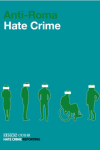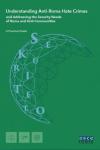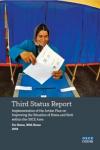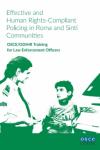Anti-Roma hate crime
OSCE participating States recognized the danger of ethnic hatred targeting Roma and Sinti as early as 1990. Anti-Roma rhetoric, including that focusing on "Gypsy criminality", can be perpetuated in the media and by political actors. EU enlargement, coupled with Roma marginalization, have led many Roma individuals and families to seek better conditions and opportunities elsewhere through migration, often encountering negative reactions in destination countries or areas. ODIHR's annual reporting on hate crime has presented a range of hate crimes targeting Roma. Assault, property damage and murder, involving the use of explosives, firearms or Molotov cocktails have featured in these reports. Among the particularly worrying incidents reported to ODIHR have been arson attacks against Roma homes.
States that report
Incidents were reported on these states
Reports
Overview of incidents reported by civil society
| Attacks Against People | Attacks Against Property | Total | |
|---|---|---|---|
| Violent Attacks | Threats | ||
| 27 | 18 | 18 | 63 |
International Reports
Croatia
In its "Concluding observations on the third periodic report of Croatia", the United Nations Human Rights Committee (HRC) called for strengthened efforts to combat racist attacks committed by law enforcement personnel, including against Roma people, by providing training and ensuring that hate crimes are properly investigated and prosecuted. The HRC highlighted the need to counter hate crimes against LGBT people, by ensuring that they are thoroughly investigated and offenders are prosecuted and sanctioned.
Czech Republic
In its "Concluding observations on the combined tenth and eleventh periodic reports of the Czech Republic", the United Nations Committee on the Elimination of Racial Discrimination (CERD) emphasized the importance of effectively investigating and prosecuting hate crimes. CERD also expressed its concern about continued racially motivated violence against Roma people and on the increase in racially-motivated violence against Muslim communities.
France
In its fifth report on France, the European Commission against Racism and Intolerance (ECRI) recommended amendments to the Criminal Code to include racist, homophobic and transphobic motivations as aggravating circumstances in criminal offences. ECRI also recommended that the authorities establish partnerships with civil society organizations working with Roma communities and people with disabilities to overcome under-reporting and to ensure that hate crime data-collection systems allow the disaggregation of data and the tracking of cases through the criminal justice system.
Slovakia
The Commissioner for Human Rights of the Council of Europe, in the annual activity report following his country visit to Slovakia, recommended including gender identity as a protected characteristic in the criminal code. The Commissioner also expressed concern at the manifestations of intolerance against Roma and Sinti people, and called on the authorities to improve the registration of hate crimes, including through the training of police.
Türkiye
In its "Concluding observations on the combined fourth to sixth periodic reports of Turkey", the United Nations Committee on the Elimination of Racial Discrimination (CERD) recommended that racist motivation should be included as an aggravating circumstance in penal legislation. CERD expressed its concern at reports of hate crimes, including against Roma people, and recommended that all hate crime cases be effectively investigated and prosecuted, that law enforcement officials be trained, and that disaggregated statistics on hate crimes be collected and published.
OSCE Region
The Parliamentary Assembly of the Council of Europe (PACE) passed a number of resolutions on hate crime issues, including Resolution 2069 on recognizing and preventing neo-racism, which recommends that hate crime legislation include the protected characteristics of race, colour, ethnicity, language, religion, disability, migrant status, sex, sexual orientation and gender identity. PACE also recognized the issue of under-reporting by calling for more systematic reporting of hate crimes.
In her "Comprehensive study of the human rights situation of Roma worldwide", the United Nations Special Rapporteur on minority issues called for the effective and prompt investigation of hate crimes against Roma individuals and communities, covering cases of unlawful use of force by law enforcement personnel. The Special Rapporteur also recommended that detailed data on hate crimes against Roma be collected and published.




